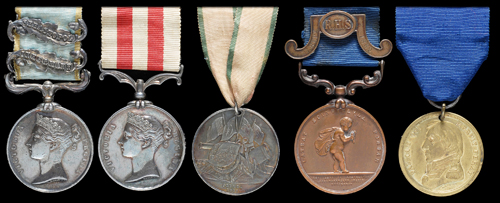
Auction: 9004 - Orders, Decorations, Campaign Medals and Militaria
Lot: 965
The Exceptional Naval Brigade Group of Five to Boatswain J. Williams, Royal Navy, Who Served in H.M.S. London During the Crimean War, And Was Mentioned In Despatches For Gallantry Whilst Serving in the Pearl Brigade During the Indian Mutiny; Williams Was Later Awarded the Royal Humane Society Bronze Medal With Second Award Bar for Rescuing Crew Mates in Australian Waters on Two Separate Occasions Crimea 1854-56, two clasp, Inkermann, Sebastopol (Jas. Williams, A.B.), officially impressed; Indian Mutiny 1857-58, no clasp (Jas. Williams, Capt. Of M....T. Pearl.), attempted erasure to part of rank; Turkish Crimea, British die, unnamed as issued, pierced for ring suspension, as issued; Royal Humane Society, small bronze medal, successful, with Second Award Bar, dated ´27. Sept. 1869.´ (James Williams, Boatswain, 13. August. 1868.); Greenwich Hospital School Prize Medal, 35mm, gilt, undated, reverse unnamed, toned, minor edge nicks throughout, otherwise extremely fine (5) Estimate £ 1,800-2,200 James Williams, born Bermuda, 1833; attended the Royal Hospital School for Boys of Sailors circa 1848; service in the Royal Navy included in H.M.S. London, 1853-56, during which time he served ashore with the Naval Brigade during the Crimea War, and was promoted from Ordinary Seaman to Leading Seaman; borne on the books of H.M.S. Pearl from January 1856, and served ashore with the Naval Brigade during the Indian Mutiny; during the latter campaign Williams was mentioned in Captain E.S. Sotheby´´s despatch of 20.10.1858, for gallantry whilst in charge of a gun in action outside of Amorha (1.10.1858), the following extract gives more incite into the general action, ´´October 1st, the patrol reported that about 1,200 of the enemy were advancing on the post in their usual three-column formation. The British force immediately moved out and took up a position in a village about 800 yards from the camp, the seamen and Sikhs being in the centre, with the infantry on either flank. At about 2pm the rebels attacked with all three columns, only to be repulsed by the accurate shooting of the guns and the rifles of the infantry. Nothing daunted, they came on again and again, though with no better success than at the first onset. After two hours, however, their fire slackened and they began to retreat, being immediately followed up by the cavalry, Sikhs and the horsed guns of the Naval Brigade. The pursuit was continued for three miles, the guns´´ crews making excellent practice with grape and case; the cavalry on the left also did good execution with their sabres´´; Captain of mast, 1.4.1858; Captain of mizen top, 26.5.1859; further postings included in H.M.S.´´s Princess Charlotte; Tartar; Wellesley and in H.M.S. Blanche, 16.1.1868-18.12.1871; whilst serving with the latter in Australian waters Williams went on to further distinguish himself by saving life at sea on two separate occasions - the Royal Humane Society Annual Reports give more incite, ´´13th August 1868, 9am. Sydney, New South Wales, 9 fathoms water, James Williams Boatswain H.M.S. Blanche, jumped overboard with all his clothes on from the top-gallant forecastle and saved H.W. Glazbrook, 1st Class Boy, of the same ship´´; on the second occasion, ´´27th Sept 1869, 5.30pm, at sea, lat.57S., long. 160E, James Williams, Boatswain H.M.S. Blanche, jumped overboard, ship going seven knots, placed a life-buoy over the head of Thomas Powell, Boy 1st Class of the same ship, and supported him until both were picked up and returned to the ship.´´ James Williams died in Haslar Naval Hospital, 1875, his widow was recorded as living at 6 Annerley Terrace, Canal Walk, Landport, Portsmouth.
Sold for
£4,500




